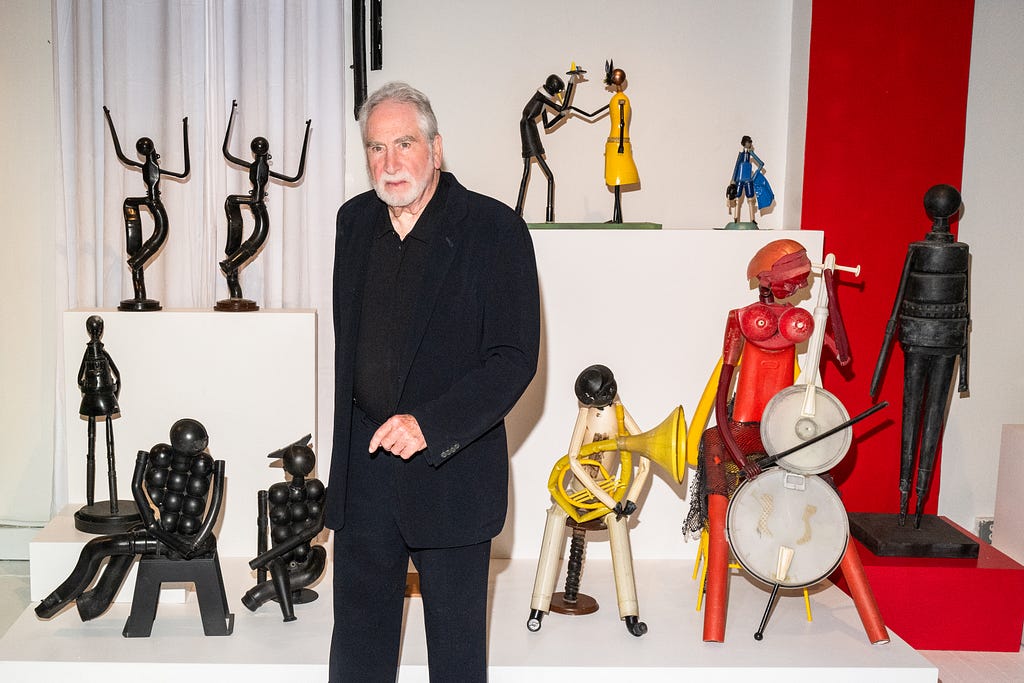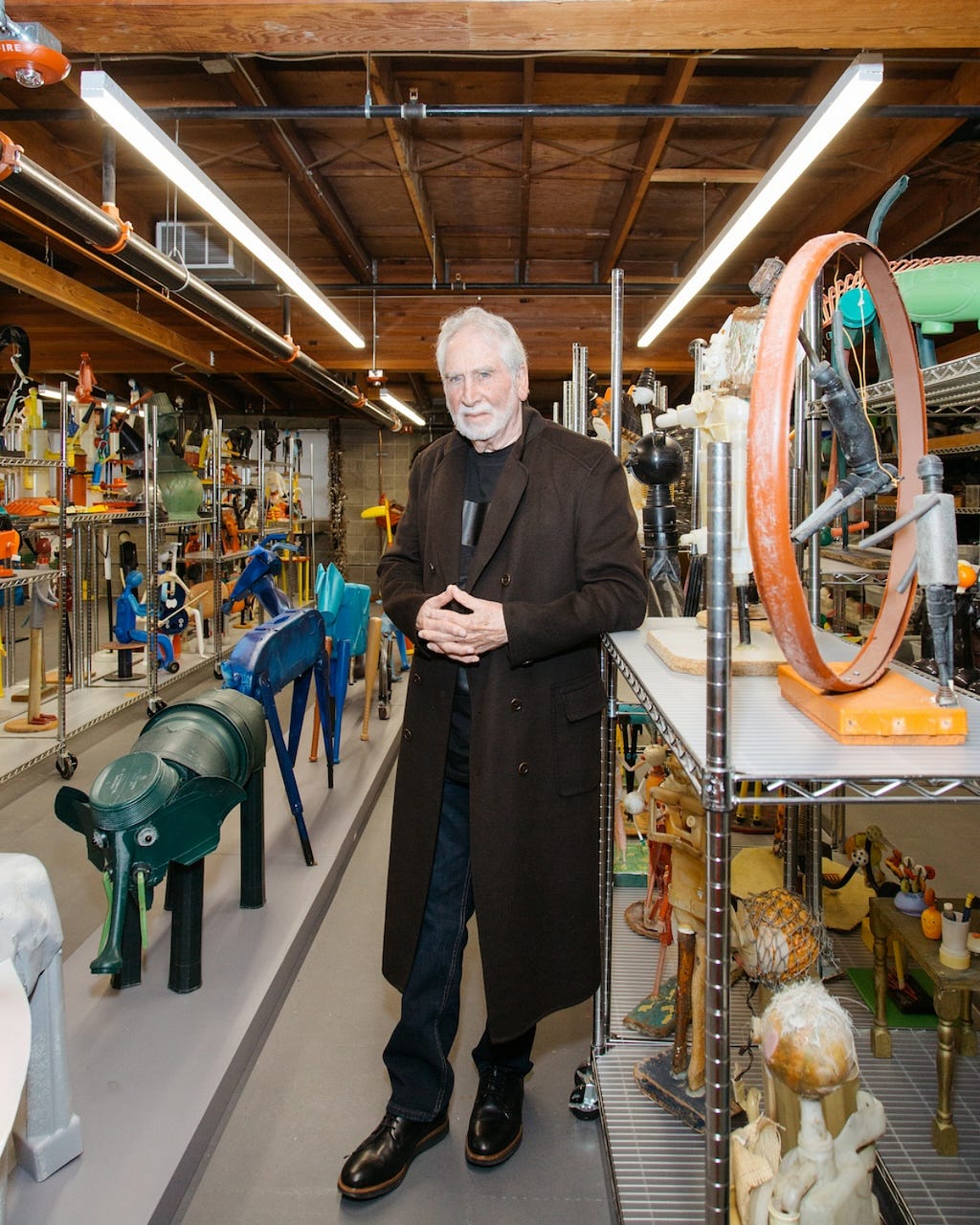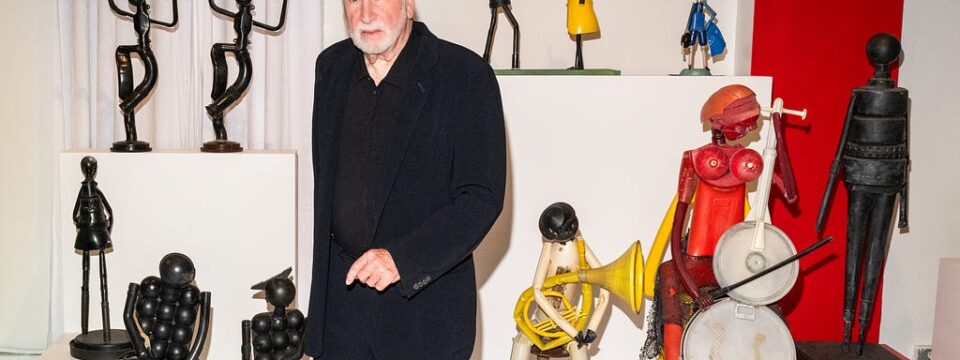
Don’t let the art world dictate what you create. I would say get a job and make your art. Do what makes you happy and make sure that you have enough income that you don’t have to prostitute yourself by doing things focused on income. That will come later if you are good. I was fortunate enough to start a bail bond company when I was 22 years old, and that gave me independence.
As a part of our series about “5 Things I Wish Someone Told Me When I First Became An Artist” I had the pleasure of interviewing Jerry Ross Barrish.
Jerry Ross Barrish, a fourth-generation San Franciscan, pursued studies in sculpture and film at the San Francisco Art Institute from 1970 to 1976. Upon earning his BFA and MFA, Barrish went on to produce three full-length narrative films. In 1988, he shifted his focus back to sculpture, specializing in creating figurative assemblages using plastic found materials, a passion he continues to pursue and create. Select notable works have been reborn into bronze sculptures. He is represented in many permanent collections including The Oakland Museum of California, Berkeley Art Museum, Crocker Museum and San Jose Art Museum. He is represented by Tuleste Factory in New York.
Thank you so much for doing this with us! Can you tell us the story of how you grew up?
I grew up in an artistic void. I did not connect with my parents. In fact, I raised my parents.
I guess one of the jokes about my life is that I never had a childhood and now I do. Now I get to play.
My parents never understood me. I almost always felt in conflict with my parents because I was consistently upset about their decision-making, even as a young boy.
I was born and raised in San Francisco, California.
I grew up at a very good time. I grew up in the 1950s. The city of San Francisco was a beautiful place to live and very adventurous and it was a pretty wonderful childhood.
But there was a challenge. I had dyslexia and school was very difficult for me. I was in “remedial everything.” I wasn’t stupid.
I was a very good basketball player. I was the class clown. I learned that I could entertain people. Everyone thought Hollywood was my destination, and it might have been except I was terrified to go to Hollywood because I couldn’t read.
I was accepted into the [San Francisco] Art Institute, and chose filmmaking as my major. I decided to make this documentary about cockfighting. I made a short film to learn how to make a movie. I did everything myself. I worked on this movie from beginning to end. And I remember the day I finished it, it was the first time in my life I truly felt that I accomplished something whole. I went outside and danced in the field next to my house.
When I look back, I will say that I grew up in a wonderful place, and had a difficult childhood.
Can you tell us the most interesting story that happened to you since you began your career?
In 1984, I met a woman named Christa Maerker. She was a writer, filmmaker, director, brilliant genius who lived in Berlin.
I met her at the Independent Feature Film Market in New York and Christa said to me, “I think I’ll recommend you for the DAAD grant in Berlin.” [Program Deutscher Akademischer Austauschdienst (DAAD) is one of the world’s most respected artist-in-residence programs for established artists working in the fine arts, film, literature and music.] I had no idea what the DAAD was, but I took her advice and I went through the process of sending all the paperwork and my films and everything.
I was in Amsterdam screening my second independent feature film RECENT SORROWS. It’s about two separate relationships, one straight and one gay, that fall apart for all the same reasons. I wanted to show that if you’re gay or straight, you still have the same problems in relationships as everybody else.
It was being screened at the American Independent Film Festival. I remember coming home late to my hotel and on the hotel room door there was a big sign that said “Congratulations. You have received the DAAD award.”
I can’t even tell you how great it was to receive it in that moment.
What are some of the most interesting or exciting projects you are working on now?
The most exciting is my new partnership with Tuleste Factory in New York. They just took me on as my US representation. My job is to make the most of what’s happening with them in New York and the shows and fairs that Tuleste Factory shows work in. I feel like a guy who just finished a movie and now has to go on the road to promote it. That’s what my job is right now.
My most recent exhibition, CHROMATIC STANCE, is on view at Tuleste Factory in New York through July 31st and will also be featured during NYCxDesign week. I am looking forward to being a part of Tuleste Factory’s exhibition at Salon Art and Design in November. On the west coast I’ll be a part of a group show in Santa Cruz this June, presenting about 12 works.
Who are some of the most interesting people you have interacted with? What was that like? Do you have any stories?
Eugene McCarthy was running for President of the United States, I was at his fundraiser and there was Jimmy Carter standing in the back all by himself. He was the Governor of Georgia, and I thought that he was the perfect Vice Presidential candidate.
I walked over and I said, ”Governor, how does it feel that you might be the next Vice President of the United States?” And he just smiled at me and we talked for a while. He had not yet declared his intention to run for President. And he was such a down-to-earth guy, just really a delightful person.
I’ve never been a star fucker. Usually I don’t get impressed with people’s credentials but I do get impressed if they’re decent people. Over the years I’ve been exposed to a lot of celebrities and athletes, who other people go gaga over. I often felt a lot of them were spoiled and privileged, and they rarely impressed me very much as decent human beings.
Where do you draw inspiration from? Can you share a story about that?
I get inspiration from everywhere. I’ve no problem with artistic blocks.
I can get inspired by the title of the song, or watching two lovers on a beach.
I can get inspired by the materials. Sometimes the materials tell me what they want to do, and sometimes I just go on my own and decide I want to do a Marlene Detrich or make an airplane.
I have an understanding of materials now where I can make almost anything. I’m always inspired. I never get tired. If I do a really major piece that takes much emotional effort to make, I might have to take a few days just to recoup or recharge my batteries but I never run out of ideas or things to do.
How have you used your success to bring goodness to the world?
I think other people have to judge that. I was really surprised with the reaction to the documentary feature made about me, “Plastic Man, the artful life of Jerry Ross Barrish”. During the first year of premiers and festivals, people would come over to me and tell me how inspiring I was. And I never felt I was inspiring. I had just followed my path.

What are your “5 things I wish someone told me when I first started out”? Please share a story or example for each.
- Don’t let the art world dictate what you create. I would say get a job and make your art. Do what makes you happy and make sure that you have enough income that you don’t have to prostitute yourself by doing things focused on income. That will come later if you are good. I was fortunate enough to start a bail bond company when I was 22 years old, and that gave me independence.
- Find your own unique voice. If you are lucky enough to get to the point where I am, that no one loves my work more than I do, it is a great buffer against setbacks.
- If you have a choice to be a sculptor or painter, I recommend being a painter. Less space, less storage, less issues. Paintings sell about 100 to 1 to sculpture. If you have a choice, paint.
- Get your education. One thing in the Jewish culture that was really always hanging over my head was education, education, education. Even though I owned a successful business, I didn’t feel good about myself until I completed my BFA and MFA programs at San Francisco Art Institute. I can’t tell you what impact it had on my life in terms of personal affirmation.
- If you’re truly an artist, you don’t have any choice in the matter (about being an artist.)
I have lived a life I did not expect growing up. Looking back, I can’t really tell you how I got here. I can’t really remember the road. But I’m just flabbergasted how grateful I am for this wonderful life that I have received.
I’ve been in love so many times in my life. I’m very lucky that I have a great wife and a great relationship, now 45 years, I think.
I’ve always loved love, I guess, and I always wanted to be a good companion and supportive, and I really feel like I’ve done that.
I’ve made a lot of bad financial mistakes in my career, where I took a lot of chances. And some of them did work out.
Here I am, 84. This is the best year of my life.
You are a person of great influence. If you could inspire a movement that would bring the most amount of good to the most amount of people, what would that be?
I feel like I’m in the Miss America contest being asked how to save the world. I don’t focus on being a celebrity, just be a decent person
My movement would be that everybody gets along.
I never take anything for granted. I never want to be a diva. I never want to act or feel like I’m better than anybody else. I always talk to everybody.
I think it’s really important to listen. To listen to what’s going on in the world. It just breaks my heart that sometimes we can’t get along.
So is there a person in the world with whom you would love to have a private breakfast or lunch with and why? You could have breakfast with anyone in the world. Who would it be?
There is this historian, Jon Meacham who I’ve seen on TV, and was really impressed with his humanity. I have never read his books but he’s written a lot of Presidential biographies.
He’s from Tennessee, a Southern guy. He’s the first person I heard use the phrase, “better angels.” Spending time with him would be interesting.
This was very inspiring. Thank you so much for joining us!
Jerry Ross Barrish: 5 Things I Wish Someone Told Me When I First Became An Artist was originally published in Authority Magazine on Medium, where people are continuing the conversation by highlighting and responding to this story.
